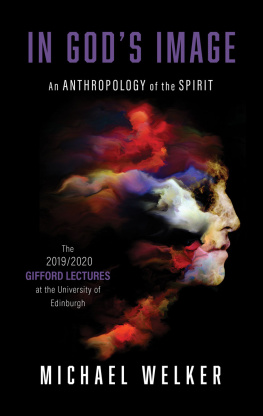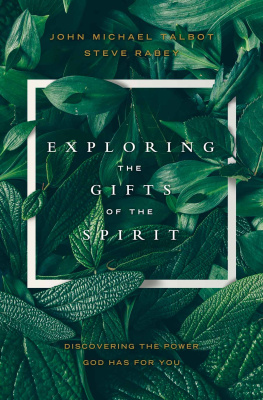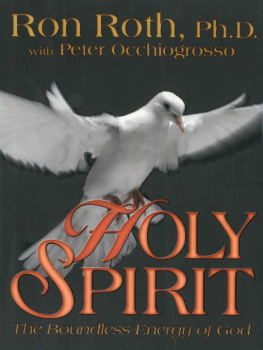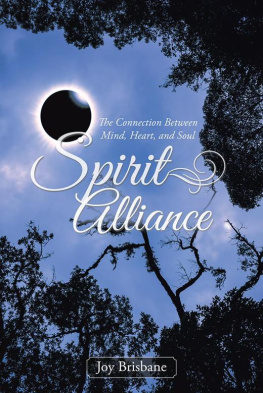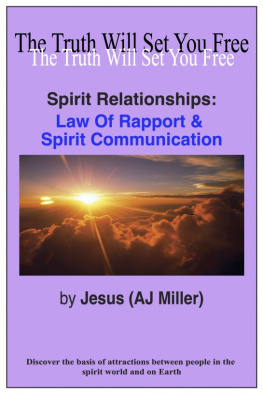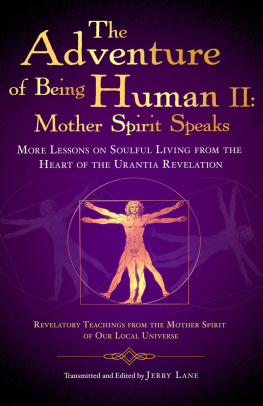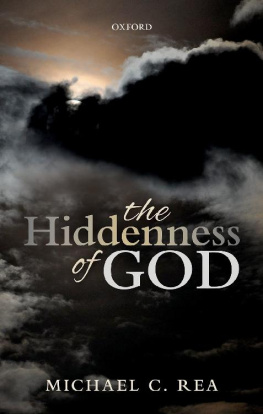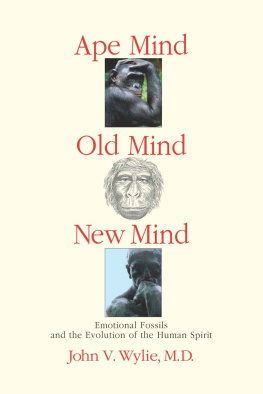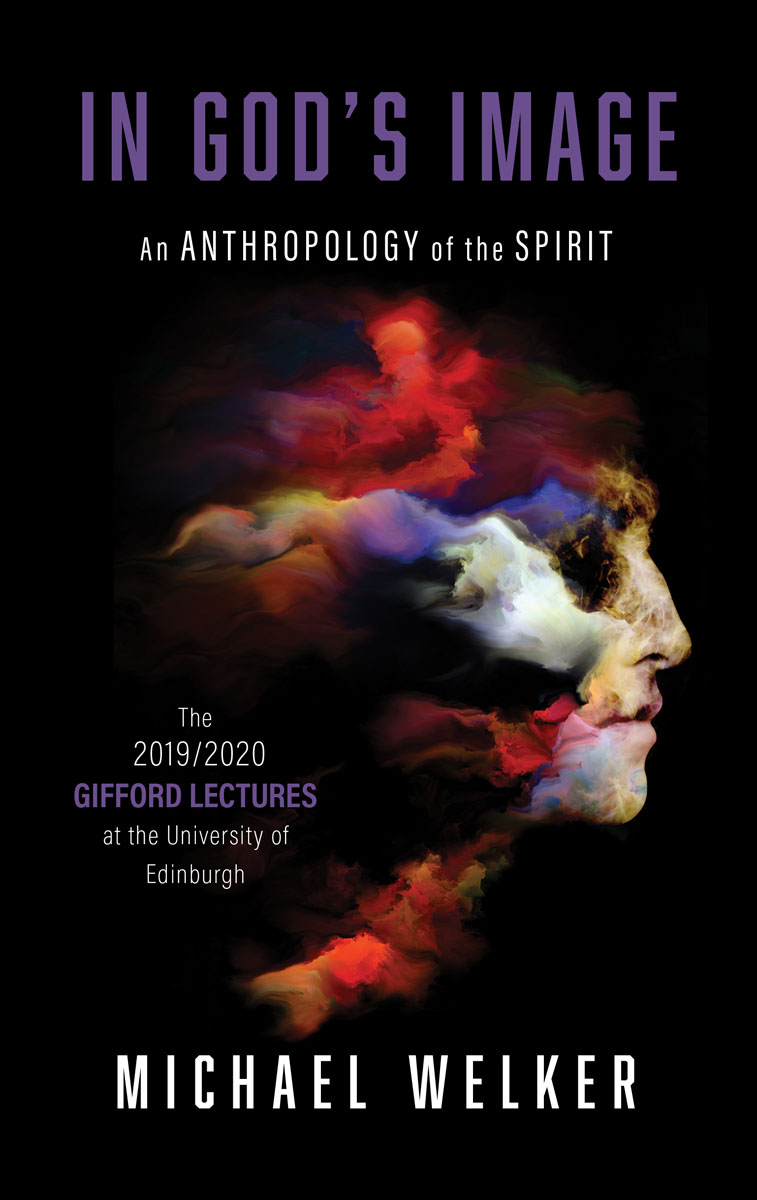

Published simultaneously in German as Zu Gottes Bild: Eine Anthropologie des Geistes by the Evangelische Verlagsanstalt in Leipzig, 2021, and in English by Wm. B. Eerdmans Publishing Co.
This English edition published by
Wm. B. Eerdmans Publishing Co.
4035 Park East Court SE, Grand Rapids, Michigan 49546
www.eerdmans.com
2021 Michael Welker
All rights reserved
Published 2021
Printed in the United States of America
27 26 25 24 23 22 21 1 2 3 4 5 6 7
ISBN 978-0-8028-7866-3 (hardcover)
ISBN 978-0-8028-7874-8 (paperback)
Library of Congress Cataloging-in-Publication Data
Names: Welker, Michael, 1947author. | Stott, Douglas W., translator.
Title: In Gods image : an anthropology of the spirit / Michael Welker; translated by Douglas W. Stott.
Other titles: Zu Gottes Bild. English
Description: Grand Rapids, Michigan : William B. Eerdmans Publishing Company, 2021. | The Edinburgh Gifford Lectures, 2019/2020. | Includes bibliographical references and index. | Summary: The 2019/2020 Gifford Lectures at the University of Edinburgh, in which Michael Welker explores the concepts of the human spirit and the divine spirit within the bounds of natural theologyProvided by publisher.
Identifiers: LCCN 2020032274 | ISBN 9780802878663 (hardcover) | ISBN 9780802878748 (paperback)
Subjects: LCSH: Theological anthropology. | Image of God. | Spirit. | Holy Spirit. | Human beings.
Classification: LCC BL256 .W43513 | DDC 218dc23
LC record available at https://lccn.loc.gov/2020032274
Unless otherwise noted, Scripture quotations are taken from the New Revised Standard Version of the Bible.
Dedicated to Ulrike, Susanne,
and Christiane Welker
C ONTENTS
Lecture 1
The Breadth and Abysses of Human Existence
Lecture 2
Human Spirit and Divine Spirit
Lecture 3
Called to Justice
Lecture 4
Called to Freedom
Lecture 5
Called to Truth
Lecture 6
Called to Peace
P REFACE
T his book was prompted by my invitation to deliver the Gifford Lectures 2019/2020 in Edinburgh. I am profoundly grateful to my Scottish colleagues for this honor, especially the Gifford Lectureship Committee, Principal Professor Peter Mathieson, and Professors Stewart Jay Brown, David Fergusson, Larry Hurtado, Mona Siddiqui, Alison Elliot, and Emma Wild-Wood. I am also grateful to Sarah Lane-Ritchie and Joshua Ralston for their reflections and comments in the Gifford Seminar. Let me also thank Mark Newman and his colleagues from the University of Edinburgh administration for their careful preparation and organization of the lecture series, Susan Halcro for a wonderful poster and leaflet templates, and Andrew Johnson for serving as the social media host for the lecture series. I thank the University of Edinburgh and the University of Heidelberg for making the presentation of the lectures accessible on YouTube.
The anthropology presented here attempts to accommodate the guidelines and expectations that the founder of these lectures, Adam Lord Gifford, formulated in his testament in 1885 concerning contributions to natural theology (see in this regard the first lecture).
Above all, it aims at a deeper and more nuanced understanding of the human spirit and the divine Spirit as a sound basis for natural theology and theology in general. In the power of this spirit, humanity can realistically be ennobled by calls to justice, freedom, truth, and peace and thereby transformed into a joyful and loving image of God. Not only religion but also politics, law, public civil-societal morals, the academy and broader education, the family, the media, and the health-care and medical systems are all capable of incorporating and strengthening this powerful spirit.
At the same time, this anthropology of the spirit questions several concepts, ideas, and theories that have in vain tried to serve the purpose of natural theology, such as an abstract theism with its untenable understanding of divine omnipotence (God, the all-determining reality). This anthropology also problematizes theories of natural law. Not only has this instrument become blunt, as Joseph Ratzinger stated in a famous conversation with Jrgen Habermas, but from its beginnings in the Corpus Iuris Civilis it has also had to struggle with inner inconsistencies in its attempts, for example, to understand nature and life as salvific terms. The sobering truth is that natural life lives indispensably at the cost of other life, and an honest, rigorously consistent natural law is inevitably the law of the stronger. This spirit-anthropology also challenges a one-sided intellectualization of the spirit, as fruitful as it has been, and an abstract dualism of spirit and body. It recommends replacing many of the traditional binary and dualistic forms of thought and perceptions that dominated human thinking in the past by cognitive, ethical, and religious sensitivities for creative multimodal spirit-constellations in thought and reality.
This anthropology has been shaped by the profound dejection I experienced in the face of twentieth-century German history, then by subsequent liberating experiences and by the theological and philosophical education I received at German universities and in international and interdisciplinary cooperation over several decades. It has also been shaped by my conviction that a lax attitude or even hostility over against the sustaining support of liberal democracies that promote and protect justice and freedom and in the face of increasing anti-intellectual emotionalization in politics and religion endangers the very groundwork and soul of civil human society. My broad educational background in the German tradition has been enhanced by numerous guest professorships and invited lectures and especially by international and interdisciplinary research projects that have continued over the years in Heidelberg, Chicago, Princeton, Cambridge (UK), and Atlanta.
The lectures published here have profited enormously from a great many discussions and cooperative research opportunities over the past years, especially with my Heidelberg doctoral candidates from fifteen countries and with colleagues from Heidelberg and at numerous universities internationally. Sources of both inspiration and opportunities for learning have included several projects in the Science and Theology Dialogue, in the Law and Religion Dialogue, in interreligious discourse, and in the incipient cooperation between theology and economics. In these contexts, I am especially grateful to John Polkinghorne (Cambridge), John Witte Jr. (Emory), William Schweiker (Chicago), and Jrgen von Hagen (Bonn).
Beyond the circle of my colleagues at the Heidelberg Theological Faculty, I received invaluable stimulation and impetus in recent years from Hans-Jrgen Abromeit, Jan Assmann, Heinrich Bedford-Strohm, Michael Bergunder, Rdiger Bittner, Armin von Bogdandy, Chun Chul, Sarah Coakley, Celia Deane-Drummond, Markus Drge, Hans-Joachim Eckstein, Gregor Etzelmller, Johannes Eurich, Sndor Fazakas, David Fergusson, Elisabeth Schssler Fiorenza and Francis Fiorenza, Michael Fishbane, Alon Goshen-Gottstein, Berndt Hamm, Tonio Hlscher, Wolfgang Huber, Jrg Hfner, Larry Hurtado, Bernd and Christine Janowski, Andreas Kemmerling, Kim Jae Jin, Kim Myung Yong, Matthias Konradt, Cornelis van der Kooi, Andreas Kruse, Peter Lampe, Norbert Lohfink, Frank Macchia, Christoph Markschies, Patrick D. Miller, Jrgen Moltmann, Piet Naud, Friederike Nssel, Bernd Oberdorfer, Manfred Oeming, Oh Sung-Hyun, Stephen Pickard, Hanna Reichel, Risto Saarinen, Konrad Schmid, Eberhard Schmidt-Assmann, Ingrid Schobert, Andreas Schle, Helmut Schwier, Christoph Schwbel, Dirk Smit, Heike Springhart, Jan Stievermann, Philipp Stoellger, Christoph Strohm, Guy Stroumsa, Kathryn Tanner, Klaus Tanner, Gerd Theissen, Gnter Thomas, Christiane Tietz, Miroslav Volf, Koos Vorster, Henco van der Westhuizen, Irmgard and Rudolf Weth, Qu Xutong, and Peter Zimmerling.
Next page
